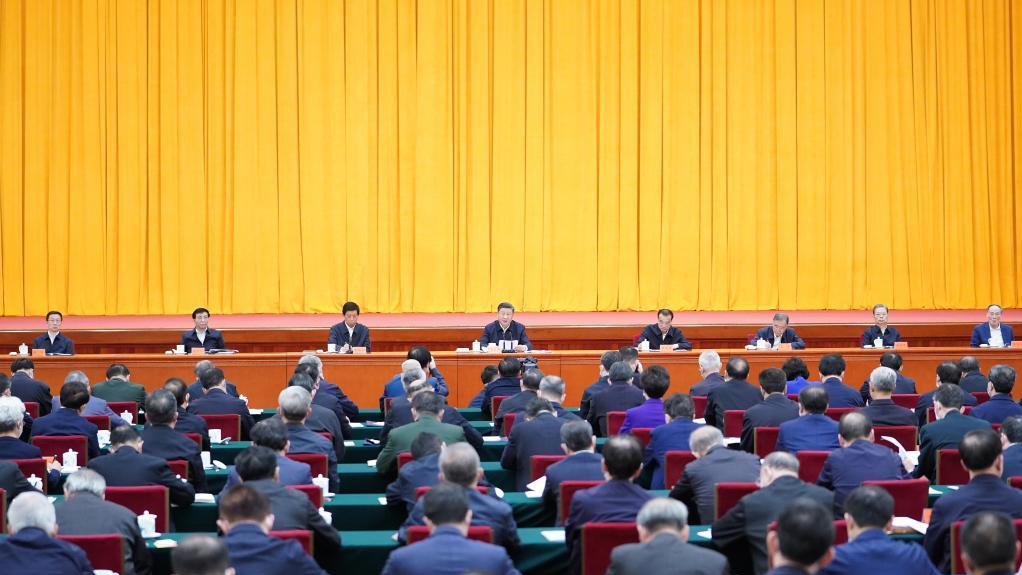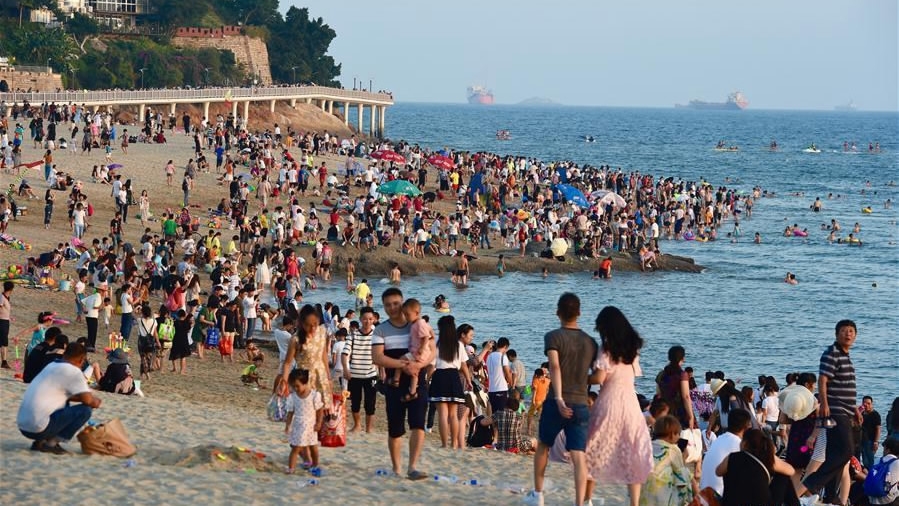
President Xi Jinping addresses the central conference on work related to the people's congresses, held in Beijing, capital of China, October 13-14, 2021. /Xinhua
President Xi Jinping addresses the central conference on work related to the people's congresses, held in Beijing, capital of China, October 13-14, 2021. /Xinhua
Editor's note: Lu Xia is an associate professor at the School of Marxism Studies and a research fellow at the National Academy of Development and Strategies, Renmin University of China. The article reflects the author's opinions and not necessarily the views of CGTN.
Chinese President Xi Jinping has highlighted upholding and improving the people's congress system and continuously enhancing whole-process people's democracy at a central conference on work related to people's congresses, held from Wednesday to Thursday in Beijing.
The history of humanity is full of great achievements contributed by people from all over the world. Among these achievements, democracy, as both a particular type of institution and a specific idea buttressing that institution, could arguably be the most significant and influential one.
In modern social scientific fields, no other research theme or topic other than "democracy" has attracted as many scholars to devote their entire careers and even their lives to the unveiling of the origins, principles, dynamism, variations, impacts of, and even challenges to democratic institutions and ideas. Some have paid attention to the philosophical principles of democracy from the angle of human ethics and morality, while others have attempted to tackle perfecting and improving democracy from a technical perspective.
Nevertheless, people still cannot sweepingly assert that we know democracy very well or we make democracy work very well. Not even close. Nowadays, few people would oppose the argument that democracy is the common value of the entire humankind, but if we take a step further, we may find a tricky thing here, which is the fact that some people are trying to monopolize the definition, standardization, realization and recognition of democracy. They think they are providing protection for democracy, yet what they are doing is just the stigmatization of democracy.
Ordinary people often criticize democracy as if all negative things result from democracy. In fact, democracy should not be blamed for bad things, but politicians should. They should be blamed for not making full democracy known to all and work for all. Media outlets in the West are now warning that there is an upcoming "crisis and declining of democracy," but maybe it is just the signal for ordinary people to start to grasp the essence of democracy.
The media should also be blamed for oversimplifying and over-standardizing the paths to democracy. Just because some obtain a goal ahead of others doesn't put them in a position to judge the paths and the speed of those who are still on their way to the goal. In the history of humankind, there was not a single and standard way to modernization; likewise, there shouldn't be one single way to democratization.

Tourists enjoy themselves on Baicheng Beach in Xiamen, southeast China's Fujian Province, Oct. 1, 2017. /Xinhua
Tourists enjoy themselves on Baicheng Beach in Xiamen, southeast China's Fujian Province, Oct. 1, 2017. /Xinhua
For too long in its modern history, Chinese people were followers and simple copiers of outside examples; even Chinese elites were simply told what to do and what not to do. When the Communist Party of China (CPC) was in its early stage, outsiders tried to convince the young CPC leaders that only proletariat strikes and riots in urban centers were the right way to the final success of the revolution. But it turned out to lead to a great loss.
Not until the CPC leaders found a Chinese way – rural encircling urban – did the Chinese revolution embrace final success. This is not the case only for China; it applies to all. In the history of humankind, not a single successful country has obtained its success by simply doing what they're told and copying outside examples.
At the turning point of its centenary celebration, the CPC would not make an error similar to its early history. It will always try to combine the external experience with Chinese reality. External experience is not wrong, but it is not always right either. And to fit the Chinese condition and reality is the key to institutional design and the supply of ideas. In the light of this background, one can fully grasp the significance of the CPC's central working conference related to people's congresses.
In his speech, on behalf of the CPC and Chinese people, President Xi declares and recognizes that democracy is the common value of humanity and it is the idea held by the Party and Chinese people. He also highlights China's contribution to the richness of ways to fulfill democracy by creating people's congresses system and making it work for all.
As the author argued in previous opinion essays, not merely the forms of government but both forms and degrees of government decide the efficacy and efficiency of institutions in a certain country. Perhaps under the current chaotic situation caused by COVID-19 and other universal crisis, strong states with stable institutions and efficient capacity might be an option.
One philosopher once argued that "people's capacity of justice makes democracy possible, and people's capacity of injustice makes democracy necessary." And perhaps we could do a resembling paraphrasing here: With democracy, what further achievements we could obtain are yet to be explored, but without democracy, the road of degradation we would embark on is sure.
(If you want to contribute and have specific expertise, please contact us at opinions@cgtn.com.)

